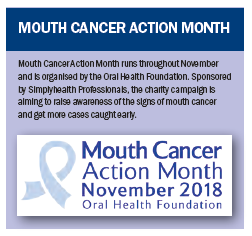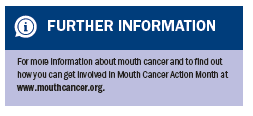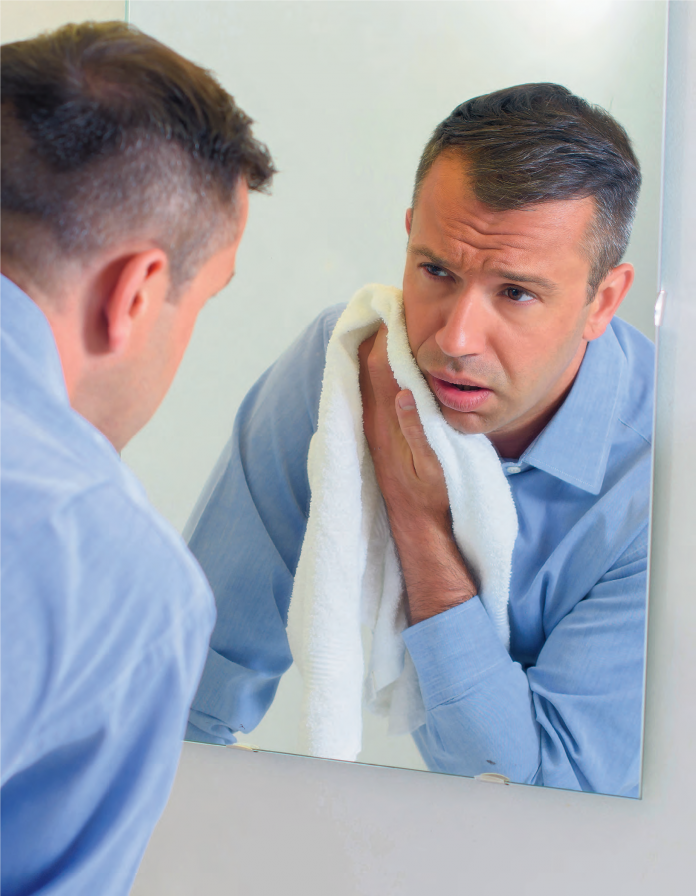everything we need to know about mouth cancer
Dr Nigel Carter OBE, CEO Oral Health Foundation
What do we really know about mouth cancer? A new piece of nationwide research as part of Mouth Cancer Action Month, paints a rather worrying picture.
The latest data shows that many Brits have not heard of mouth cancer while even fewer know about its causes, symptoms and what it can mean for those who are diagnosed with the disease. This is extremely concerning – especially given that mouth cancer cases are on the increase.
Over the last decade, mouth cancer diagnosis’ have risen by a startling 39% in the UK. This is more than five times that of all other cancer cases in the country (7%).
Also, because most of us are not sure what to look for, many mouth cancers are not spotted early enough. This is a serious problem and means the survival rates for mouth cancer have barely improved over the last 30 years.
During November, Mouth Cancer Action Month raises awareness of mouth cancer and promotes the importance of early detection. Our current knowledge levels of mouth cancer in the UK are dangerously low and we need to do more to help catch cases as early as possible.
To help us do this, here is everything we need to know about mouth cancer – it could be lifesaving.
Risks and causes
 Almost 90% of mouth cancer cases can be linked back to lifestyle factors. It is important that everybody is alert to what these are, so we can understand our own risk of developing mouth cancer.
Almost 90% of mouth cancer cases can be linked back to lifestyle factors. It is important that everybody is alert to what these are, so we can understand our own risk of developing mouth cancer.
By far the leading cause of mouth cancer in the UK is smoking – linked to three quarters of all mouth cancers. Whether this is cigarettes, cigars or pipe smoking, toxic chemicals enter
the body through our mouth and the damage this causes can be quick and devastating.
Drinking alcohol to excess is also a major cause of mouth cancer, and when combined with smoking, it can increase your risk of mouth cancer by up to 30 times.
Certain traditional habits with south Asian communities like chewing tobacco, betel quid, gutkha and paan, are particularly dangerous. This can be seen in communities where these habits are common as mouth cancer rates are much higher.
Another major cause of mouth cancer which is getting much more visibility lately is the human papillomavirus (HPV). Many people have heard of HPV as it’s the cause of almost all cervical cancers, but some of us are still not aware of the full extent of diseases that HPV can lead to.
HPV also causes, mouth cancer, anal cancer and penile cancer, as well as problems like genital warts. It is the most common sexually transmitted infection in the world, and for those who are sexually active and have not been vaccinated, the chances of catching HPV are tremendously high. There are lots of types of HPV. Most are symptomless and only a few can
cause cancer.
HPV can be spread to the mouth through oral sex, and research now suggests that it could soon rival smoking and drinking as one of the main causes of mouth cancer. Practicing safe sex and limiting the number of partners you have may help reduce your chances of contracting HPV.
 Earlier this year, it was announced that the UK will finally have a gender-neutral HPV vaccination programme. British girls have been given the vaccination for a decade, so it is wonderful to see boys now included. Despite this, there remain millions of men and women that are unprotected and at risk of HPV-related diseases.
Earlier this year, it was announced that the UK will finally have a gender-neutral HPV vaccination programme. British girls have been given the vaccination for a decade, so it is wonderful to see boys now included. Despite this, there remain millions of men and women that are unprotected and at risk of HPV-related diseases.
It’s important to understand that everybody is at risk of mouth cancer, even if we don’t associate ourselves with any of the above risks. Mouth cancer can affect anyone and can develop spontaneously. It is therefore vital that we are all aware of the disease’s signs and
symptoms.
Signs and symptoms
 I would bet that almost everybody knows that a lump on the breast could potentially be a sign of breast cancer. Just as we know a lump on a testicle could be a sign of testicular cancer. Disturbingly, this knowledge is not shared when it comes to the mouth. Our research reveals less than two thirds of us (59%) recognise that lumps or swelling in the mouth, head or neck are a potential sign of mouth cancer.
I would bet that almost everybody knows that a lump on the breast could potentially be a sign of breast cancer. Just as we know a lump on a testicle could be a sign of testicular cancer. Disturbingly, this knowledge is not shared when it comes to the mouth. Our research reveals less than two thirds of us (59%) recognise that lumps or swelling in the mouth, head or neck are a potential sign of mouth cancer.
Alongside this, a little over half of us (56%) know that mouth ulcers which do not heal within three weeks are a possible indicator of mouth cancer. Only four in ten (40%) of us recognise that red patches could be a warning sign and awareness falls even further for white patches (36%).
I know that if I had a sore or unexplained problem appear on any other part of my body for more than a couple of weeks, I would get it checked out as soon as possible. So why should my mouth be any different?
By being aware and alert to these early signs and symptoms of mouth cancer we can help catch cases early – something which is vital if we are to help reduce the devastating impact of this disease.
The effects of mouth cancer
 Many of us may have become accustomed to our mouth ‘sorting itself out’ and stop paying close enough attention to what is going on. This limits our ability to recognise the signs of
Many of us may have become accustomed to our mouth ‘sorting itself out’ and stop paying close enough attention to what is going on. This limits our ability to recognise the signs of
mouth cancer early and change the potential outcomes.
Many mouth cancers are caught too late to give a person the opportunity of a positive
outcome. It is estimated that chances of five year survival based on a late diagnosis is in the
region of 50% but this can be transformed to 90% if it is caught early enough. This is exactly why all of us must be aware of any changes in our mouth and get anything that we feel is unusual checked out by our dentist or doctor straight away.
Our research shows that men need to be more aware as they are remarkably worse at recognising every single major sign of mouth cancer, compared to women. Yet, more than twice as many men are diagnosed with mouth cancer as women. Men especially, need to be vigilant of the signs and symptoms of the disease.
For people who survive a battle with mouth cancer, the ongoing physical and psychological
effects can be equally devastating. Many mouth cancer sufferers lose their ability to eat and drink properly and very often speech is affected and even lost. The psychological scars, for some, can be even worse as treatment is often long, painful and difficult to endure.
The best way to combat mouth cancer is to be alert to the signs and symptoms. Check for them regularly and seek the advice of a health professional straight away if you are worried by anything.
If in doubt get checked out
Self-examination can be the key to beating mouth cancer and should be done on a regular basis. Yet, according to our research, most of us are not aware of where we should be looking in our mouth for the early signs of mouth cancer. The following areas should be regularly examined:
- Head – Does your face looks the same on both sides? Check for any unusual lumps or swellings that only appear on one side of your face.
- Cheek – Open wide and have a look at the inside of your cheek, pay special attention to look for any red, white or dark patches, tenderness or ulcers.
- Roof and floor of your mouth – Check for unusual or tender lumps or bumps on the roof of your mouth then lift your tongue and do exactly the same underneath it. Be alert to any ulcers which you may have had for a while too, they don’t have to be painful to cause serious problems.
- Lips – Pull your best pout then go a little further by pulling down you lower lip to have a closer look for any sores or unusual changes in colour.
- Tongue – Say ‘ahh’ and stick your tongue out at yourself. Look for any unusual changes in colour or texture on its surface, changes in colour or ulcers on the sides. Try and touch your nose with your tongue and make sure you check underneath too.
- Neck – Have a good feel around your neck, paying close attention to the side and the front to see if there is anything unusual or you have not felt before. Pay close attention to any lumps or bumps or any tenderness.
 We all need to be aware, and also act quickly in seeking the help when needed. Reach out to a dental professional or doctor. They can give you a visual mouth cancer examination, along with advice about spotting mouth cancer and take us through a self-check we can do at home.
We all need to be aware, and also act quickly in seeking the help when needed. Reach out to a dental professional or doctor. They can give you a visual mouth cancer examination, along with advice about spotting mouth cancer and take us through a self-check we can do at home.







